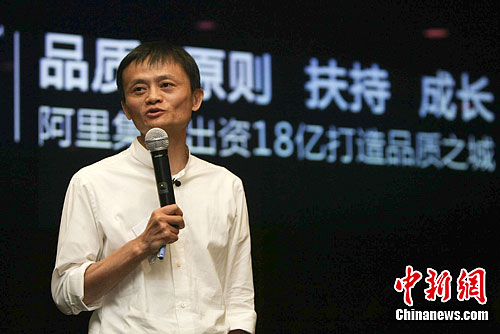(Ecns.cn) – Taobao Mall, China's largest business-to-consumer (B2C) e-commerce platform, which had repeatedly asserted it would "never give up" on its progressive reform, finally made a concession after a wave of mass web protests over the planned fee hikes.
On October 17, 2011, Ma Yun (or Jack Ma), CEO of Taobao's parent company Alibaba Group Holdings Ltd, announced a 1.8 billion yuan ($278.3 million) investment plan to aid the development of small- and medium-sized enterprises.
Ma noted the original plan will be revised and thus allow a nine-month grace period on the fee rise for merchants who registered on the shopping site before the new policy. Besides, all merchants will enjoy a 50% discount on their liability deposit.
According to Ma, Alibaba will appropriate 1 billion yuan ($154.6 million) to fund the other half of the liability deposit but use it for consumers' interests. The fund will be managed by the Bank of China and be under the supervision of the Industrial and Commercial Bureau of the Zhejiang Province.
Troubles break out after new policy released
On October 10, 2011, Taobao said it would increase its annual technical service fees from 6,000 yuan ($927.6) to two new packages costing 30,000 yuan ($4,638) and 60,000 yuan ($9,276), an increase of five and ten times respectively.
Meanwhile, Taobao's new policy also involved a liability deposit which would be forfeited if merchants breached their contract. Businesses that set up stores at the Taobao Mall would be required to set aside the liability deposit—either 50,000 yuan ($7,730), 100,000 yuan ($15,460), or 150,000 yuan ($23,190)—in their Alipay account. This was believed to be a move made to increase the cost to businesses should they violate their contract terms.
Soon, thousands of discontent small vendors united and formed an "anti-Taobao Alliance," describing their mission as "fighting against the landlord." They targeted big brands including Japanese clothing chain Uniqlo on Taobao Mall by purchasing thousands of products and then asking for refunds, Xinhua said, which resulted in decreased customer ratings that lowered the rankings of the shops.


















